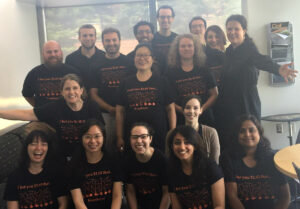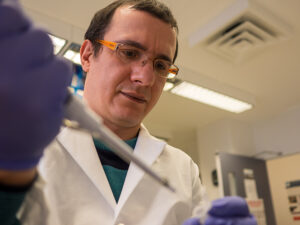Enter your address to receive notifications about new posts to your email.
Featured
-
Featured
Terry McGlynn: Navigating a career and family
In the Decoding Life series, we talk to geneticists with diverse career paths, tracing the many directions possible after research training. This series is brought to you by the GSA Early Career Scientist Career Development Subcommittee. Dr. McGlynn received his PhD in Environmental, Population, and Organismic Biology from the University of Colorado. He was an…
-
Featured
NUKUs: A new primate retrocopy family with distinct functionality
Multiple divergent retrocopies of the well-characterized Ku70 gene were identified in humans and other primates. The last 63 million years of primate evolution have been strongly shaped by genetic retrotransposition; thousands of genes and proteins with new functions have evolved from retrocopies scattered throughout the genome. These retrocopies arise when retrotransposons reverse transcribe a cellular…
-
Featured
Working together during the COVID-19 pandemic, a silver lining in a trying time
Guest post by A.J. Marian Walhout, PhD. Massachusetts, March 2020: The early days of the COVID-19 pandemic that would profoundly affect us all. Labs shut down abruptly, assay trials were disrupted, some experiments in progress were thrown out. Now what? With pipettes unused on the bench and the foreseeable future unclear, how long would this…
-
Featured
PMI Expressions: Xin Jin
Join us for the PMI Expressions series, where we will get to know the 2021 cohort of GSA Presidential Members. Xin Jin Assistant Professor Department of Neuroscience The Scripps Research Institute What is your current research? My longstanding interest is to understand how brain development is shaped by genes and environment, and how these factors…
-
Featured
Kellyann Jones-Jamtgaard: A career opportunity and network building success story
Kellyann Jones-Jamtgaard is a Biological Sciences Specialist at the USDA, where she supports education grant programs. Here, she talks about her passion for communicating the value of science to society and how that led her to pursue a career in science education and policy. In the Decoding Life series, we talk to geneticists with diverse…
-
Featured
2021 Novitski Prize: Feng Zhang
Sydney Brenner famously noted that progress in genetics “depends on the interplay between new techniques, new discoveries, and new ideas, probably in that order of decreasing importance.” In the 40 years since those words were recorded, new techniques have propelled the field of molecular biology to heights barely imagined at its inception. This year’s recipient…
-
Featured
Finding a happy medium boosts ChIP-seq data quality
Every lab wants to produce high-quality, reproducible data. But when that data is destined for use by the whole community as part of an international consortium, there is an even greater incentive to ensure the highest standards. A new paper in G3: Genes|Genomes|Genetics defines a critical step for the success of widely-used gene regulation experiments. …
-
Featured
Interview with Hugo Bellen and Shinya Yamamoto on the Model Organism Screen Centers of the Undiagnosed Disease Network
This is a guest post by Sarah Marshall, originally published in the Undiagnosed Disease Network’s Participant Engagement and Empowerment Resource (UDN PEER). In April 2021, I had the pleasure of interviewing Drs. Hugo Bellen [2021 GSA President] and Shinya Yamamoto about their work at the Model Organisms Screening Center (MOSC) at Baylor College of Medicine,…
-
Featured
Vincenzo Alessandro Gennarino on curiosity, hard work, and passion for helping others
In the Decoding Life series, we talk to geneticists with diverse career paths, tracing the many directions possible after research training. This series is brought to you by the GSA Early Career Scientist Career Development Subcommittee. Vincenzo Alessandro Gennarino is an Assistant Professor of Genetics & Development at Columbia University Irving Medical Center. His career,…
-
Featured
Kailene Simon: Finding inspiration and navigating roadblocks
In the Decoding Life series, we talk to geneticists with diverse career paths, tracing the many directions possible after research training. This series is brought to you by the GSA Early Career Scientist Career Development Subcommittee. Kailene Simon is a scientist not just driven by passion, but by cause. When she was in high school,…
-
Featured
2021 Genetics Society of America Medal: Douglas Koshland
Failure of chromosomes to segregate properly results in severe medical conditions, or even death. Yet for a long time, it was challenging to study exactly how chromosomes carry out their complex choreography, due to a lack of robust tools for combining chromosome visualization and genetic experiments. Douglas Koshland spent his postdoc studying mammalian chromosome biology…











